Medical negligence can happen in any hospital. Patients suffer poor treatment in the operating theatre, on the ward or in the accident and emergency department resulting in a claim for hospital negligence.
When medical negligence happens in hospital you the patient or a loved one will have a clinical outcome which would not have occurred had the correct care been received. This worse clinical outcome will involve any of the following such as pain and suffering, a delayed recovery, a worse long term outcome which in the most tragic of cases may result in death.
A hospital negligence claim is designed to compensate you for the worse outcome including any ongoing care requirements or further treatment. If you have been a victim of hospital negligence you may be entitled to compensation.
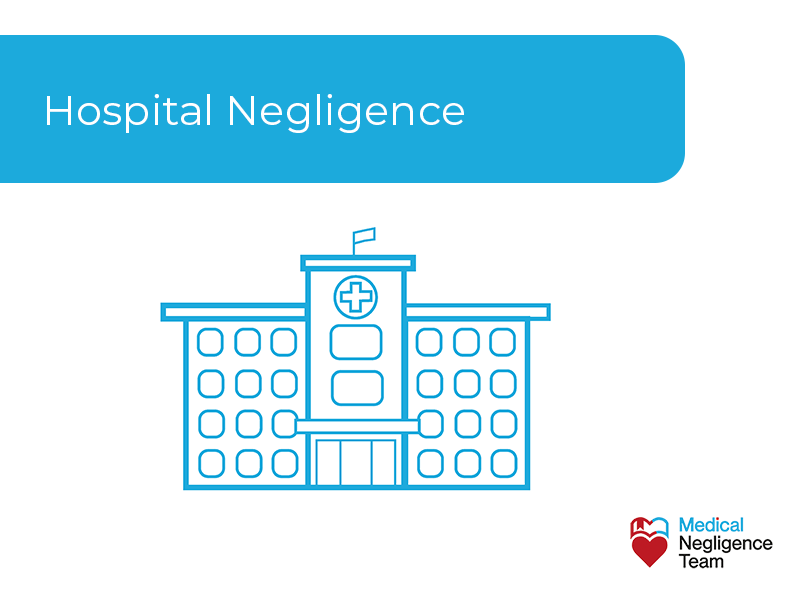
Table of content
What is Hospital Negligence
Hospital negligence is when your treatment is below the standard you can reasonably expect. It is so poor that no other doctor or nurse acting reasonably would provide such poor care. You enter a hospital to get better, not become worse due to hospital or medical negligence. Yet it happens, and a lot more often than you may think.
Seeking medical negligence compensation may be your only option.
What is a hospital negligence claim?
Victims of clinical negligence are entitled to compensation to right the wrong of their medical treatmentPursuing a hospital negligence compensation claim will involve using a no win no fee medical negligence solicitor to handle your claim for you.
Hospital negligence compensation will pay for any treatment required to correct your worse condition as a result of hospital negligence. It will also compensate you for pain suffered, loss of earnings and any long-term care you need.
All losses you have suffered as a result of hospital negligence can be recovered in a hospital negligence compensation claim providing it can be proved that such losses are directly as a result of the hospital negligence.
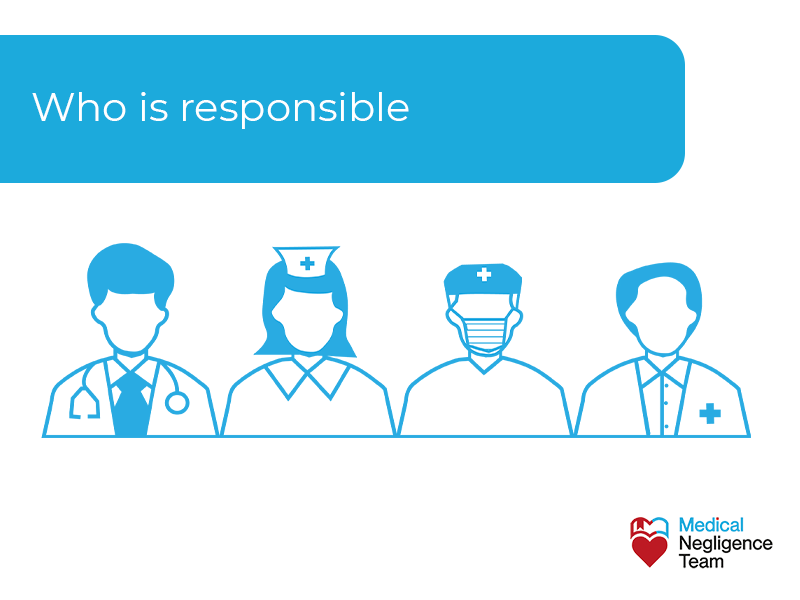
Have you been a victim of medical negligence?
Knowing that something went wrong with your treatment is a vital first step to starting a hospital negligence claim.
People may not immediately realise that they suffered medical negligence and put any complication, side effects down to chance or bad luck.
The only way to know for sure is to contact an experienced no win no fee medical negligence solicitor. They will have the experience to be able to tell you whether what has happened is medical negligence by a hospital.
In surgical terms certain things are what are called non-negligent known complications.
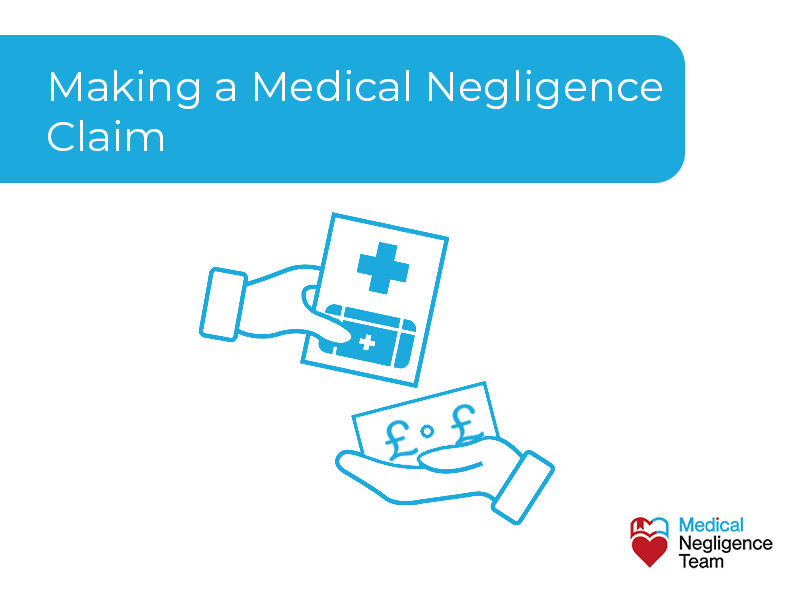
For example an incisional hernia, a hernia into where the surgeon made their incision, during an open operation (not keyhole) would in most circumstances be non-negligent.
But in a gallbladder operation a surgeon cutting through the common bile duct by mistake or damaging the bowel some distance away from the surgical site would be considered negligent.
An experienced hospital negligence solicitor will be able to tell you whether you do have a valid compensation claim and will be able to obtain your medical records to investigate the claim further.
An important phrase to listen for is when a doctor or nurse says they want to speak to you on behalf of the hospital under what is known as a Duty of Candour. Candour is defined as the quality of being open and honest; frankness.
Hospitals will speak to you and loved ones under a Duty of Candour when they feel something has gone wrong which should not have. They are encouraged to be upfront, open and honest that something went wrong.
Another important indicator that you may have suffered from hospital negligence is when the hospital files what is known as a Datix report or they say that they are going to undertake a Serious Untoward Incident Investigation or Root Cause Analysis. In relation to birth injury claims the hospital may also appoint an external body called the Healthcare Safety Investigation Branch to do an external independent investigation of a cerebral palsy from birth or the tragedy of a stillbirth.
If you hear a doctor or nurse use any of the following terms such as Duty of Candour, Datix report, serious untoward incident investigation, root cause analysis, or healthcare safety investigation branch you should contact a hospital negligence solicitor immediately.
Types of hospital medical negligence
There are as many types of medical negligence as you can imagine. Every hospital has so many specialist departments and clinics, each with its problem areas. Being aware of where your medical treatment went wrong may open your eyes.
Let’s take a closer look at examples of clinical negligence and how they can impact your life.
Gallbladder surgery claims
Cholecystectomy (removal of the gallbladder) is usually performed laparoscopically but may be by open surgery. Damage to the bile duct may occur and is often due to surgical error – failure to identify the structures.
It is crucial that the structures have been correctly identified as there are anatomical variants. Damage to the bile duct results in biliary leak; this may be apparent at the time of operation or in the post-operative period.
Negligence claims may concern the occurrence to the bile duct damage itself, failure to recognise such damage, and delay in diagnosis of the biliary leak in the post-operative period.
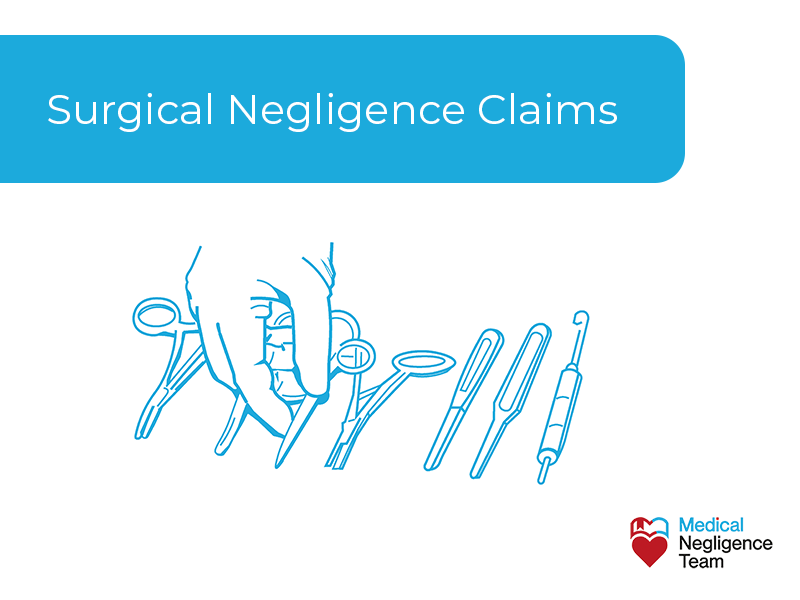
Cauda Equina Syndrome delay in diagnosis
The cauda equina (Latin for “horse’s tail”) consists of the nerve roots that originate from the lower end of the spinal cord within the lower part of the spinal canal. These nerve roots emerge from the spinal column.
The cauda equina may be compressed by a central prolapsed disc – it may occur where there is already a history of degenerative back disease and prolapsed disc.
Typical features include back pain, bladder and bowel disturbance, numbness over the bottom, back of thighs and between the legs (“saddle anaesthesia” the contact points when riding), numbness in the ano-genital area, and leg weakness.
Recognising the condition in good time is crucial so that emergency decompression surgery can be performed.
Surgery may result in complete or partial recovery where there are persisting problems of leg weakness, incontinence, sexual dysfunction, saddle and perineal anaesthesia.
Claims in respect of cauda equina syndrome may concern allegations of delayed or missed diagnosis resulting in delayed surgical decompression leading to irreversible nervous injury.
Missed Fracture
Fracture – a break in the bone – usually results from trauma. Typically there is pain, bony tenderness, inability to use the affected part, and sometimes deformity; there may be multiple fractures, and associated injury to nerve or blood supply.
A fracture may be suspected on clinical examination, but is usually confirmed by x-ray.
The assessment of an injury may or may not include x-ray.
Fractures may be missed at medical assessment; this may be for a number of reasons including: failure to suspect fracture and so failure to x-ray; not seeing the fracture on x-ray; failing to recall the patient where an initially missed fracture is identified.
A missed fracture may result in persisting pain and reduced movement, deformity and non-union. It may require surgery when eventually diagnosed.
Missed Scaphoid Fracture claims
The scaphoid is one of the bones of the wrist. It is typically caused by a fall onto the outstretched hand. It may also occur in sport.
Clinical assessment may reveal tenderness at points in the wrist and reduced movement.
Conventional x-rays may not reveal a scaphoid fracture; special scaphoid views may be required.
Even if the x-ray is normal, if there is tenderness of the wrist so that scaphoid fracture is suspected the injury is treated presumptively as fracture by immobilisation; the patient is recalled for review.
A missed scaphoid fracture may lead to poor healing (mal-union) or to the bone dying from loss of it blood supply. Surgery may be required.
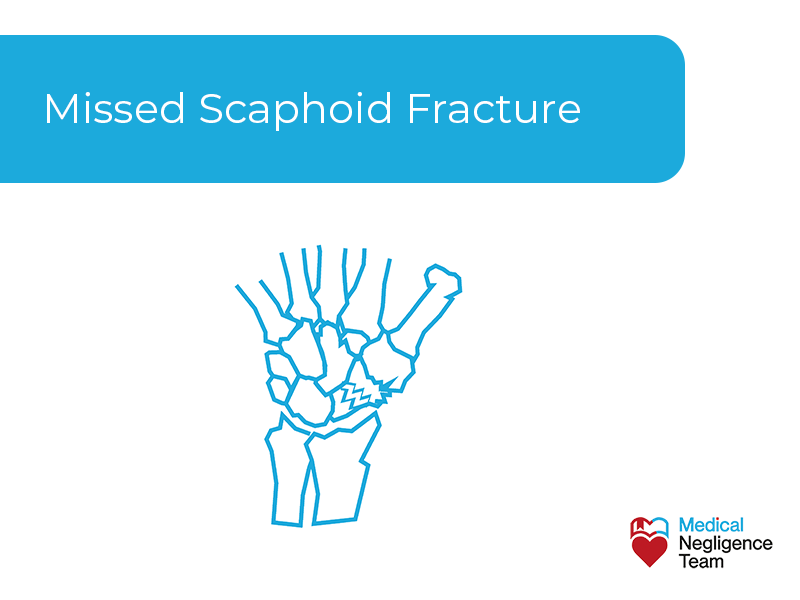
Chest pain: missed diagnosis of heart attack or lung clot
Chest pain is a significant symptom which can be caused by conditions including: heart disease, clot in the lung, chest disease, and indigestion. It may also be caused by less serious disease such as muscle strain. It requires careful assessment and appropriate investigation.
Negligence claims may arise where a serious cause of chest pain has been missed and attributed to a trivial cause because of inadequate assessment and investigation.
Missed diagnosis of a heart attack is a from of Medical Negligence and may result in serious outcomes.
Cancer misdiagnosis and late diagnosis claims
Unfortunately medical negligence claims around cancer diagnosis, both missed and late, are far too common. A missed symptom, or one picked late up in the diagnosis, may prolong suffering and change a patient’s life.
Medical professionals should take the time and effort not to miss any signs of the illness. Cancer tests usually have a clear outcome and should not be misread. It happens, and cases often start when a scan is ignored, not read or histology is not read properly. Cancer misdiagnosis or incorrect treatments can come from blood results not being investigated fully. Another avoidable error.
Your life can change quickly when you contract cancer. Misdiagnosis or late diagnosis lets a cancer spread unchecked. Your medical negligence claim pursues the compensation you require to make your life comfortable again.
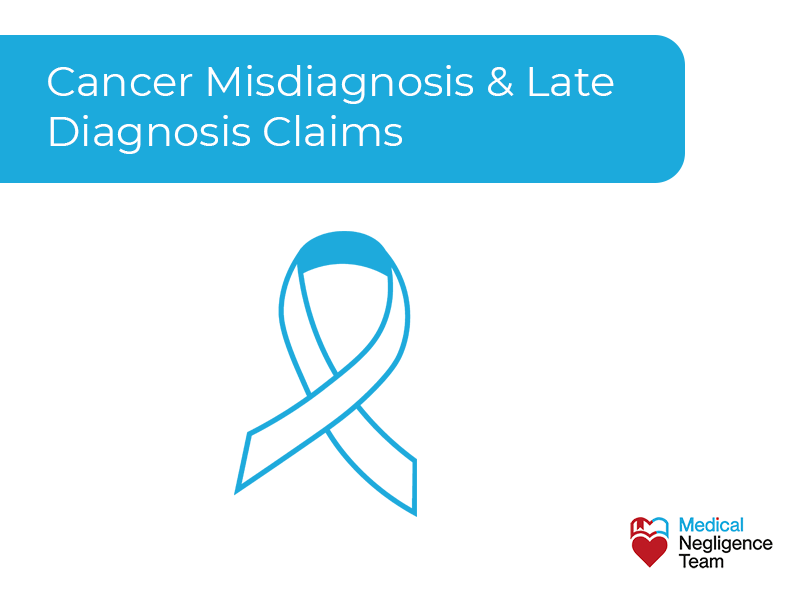
Surgical error claims
Human error may occur so that the surgery is performed “wrongly”: wrong site, wrong side or wrong operation. Such cases are often human error or down to system failures.
Such cases are often referred to as never events as they simply should not occur. Claims may arise in respect of surgery from the performance of the surgery itself and /or from the consent for such surgery (see above).
Surgical Negligence claims include:
Retained surgical items
All sorts of items are used in the course of procedures including instruments, swabs, needles, drains, catheters, and so on.
There are procedures to ensure that items are accounted for at the end of a procedure. The retention of foreign items during surgery is a never event and is a serious medical negligence case.
Surgical complication bowel injury
The bowel may be injured in the course of an abdominal procedure. There may be fault associated with:
(1) causing the bowel injury.
(2) failing to detect the bowel injury at the time of the procedure.
(3) delay in diagnosing the bowel injury in the post-operative period.
Surgical complication bladder and ureter injury
The bladder and/or ureters (the tubes from the kidney to the bladder) may be injured in the course of surgery. There may be fault associated with:
(1) causing the injury
(2) failing to detect the injury at the time of the procedure
(3) delay in diagnosing the injury in the post-operative period.
Failing to deal with a ureteric injury can have catastrophic consequences such as the loss of a kidney.
Cerebral palsy
Cerebral palsy is the general term for a number of neurological conditions that affect movement and coordination. It is usually due to injury to the baby’s brain that can occur before, during or after birth. There are many causes and varying degrees of severity. The condition may only become apparent when the baby fails to achieve development milestones.
Some cases of cerebral palsy may be due to mismanagement of pregnancy and labour – the baby may be starved of oxygen so as to cause brain damage. Such cases may give rise to a negligence claim; the compensation level may run into millions to fund the future needs of the child.
Pressure sore negligence claims
Incapacitated patients, due to injury, old age or long-term recovery need specialist medical care and support services. Simple procedures like turning the patient regularly, can make a big difference. Busy staff may forget you, but lying in the same place in a hospital bed causes pressure sores, which are very painful.
Pressure sores are difficult to cure and get infected. They are one of the most common side-effects of being in hospital for long-term care, yet are probably the easiest to avoid. Medical negligence solicitors deal with claims around pressure sores almost daily, they are that common a complaint.
More claim types
Other hospital negligence claims include misdiagnosis, nerve damage, lack of informed consent, falls while in hospital, pregnancy and birth errors.
How does negligence happen in a hospital
Mistakes and medical negligence claims
Medical professionals make mistakes, but when due to medical negligence the patient will suffer, unnecessarily. In hospital a doctor may make mistakes due to being overworked or nursing staff may fail to adequately transfer information between shifts or not do medical observations as frequently as they should.
How to make a medical negligence claim
Getting you through the process of seeking compensation arising from hospital mistakes and misdiagnosis or poor care is what experienced medical negligence solicitors do.
Medical mistakes need to be put right and you need to be compensated for such mistakes. Your medical negligence claim will get you treatment to alleviate the extra suffering.
When medical staff in hospital provide negligent treatment, the patient suffers. The right legal team will put that right.
Speak with The Medical Negligence Team to make a medical negligence claim today!
Step 1: Seek medical advice
Seek medical advice on the injuries you have suffered or are suffering with immediately you realise you experienced surgical negligence.
Step 2: Contact a specialist medical negligence solicitor
Contact a specialist medical negligence solicitor who operates on a No Win No Fee basis and tell them what went wrong. The right solicitor will look at your case, see where the problem lies, and advise if you suffered surgical negligence.
The Medical Negligence Team also has a 100% Compensation Guarantee scheme, where you get all the money awarded in a negligence claim.
You are the one who suffered medical negligence, and you should get all the money due for the suffering.
Step 3: Your medical negligence solicitor obtains your medical records
Your medical negligence solicitor obtains your medical records with your permission. By reading your records, they will confirm if they think you have a valid hospital negligence case.
The medical negligence team will know from reading your medical records if the case will result in hospital negligence compensation being paid.
Step 4: The medical negligence solicitor sending a letter of claim to the negligent party
The medical negligence solicitor sending a letter of claim to the negligent party is the next step. The letter will ask them to admit surgical negligence in what is known as ‘sending a letter of claim.’
When the negligent party receives the letter of claim, it has up to four months to provide a written response.
Step 5: Getting a response from the negligent party’s insurer
Getting a response from the negligent party’s insurer will move your compensation claim closer to a conclusion.
The insurer will either admit the medical negligence or say they intend to defend the case. Deciding to defend the case is known as ‘deny liability’ in legal terms.
If they admit liability, your hospital negligence claim can be valued.
The two parties will meet to decide on your surgical negligence compensation payment.
Your solicitor will negotiate with the negligent party and use their experience to get the compensation you deserve.
Step 6: Issuing court proceedings
ssuing court proceedings is the next step if they deny liability in your surgical negligence case. Going to court happens, too, when they are not prepared to pay a fair amount for the injuries you have suffered.
Your medical negligence solicitor issues the court proceedings.
Remember that less than 1% of medical negligence cases go to trial.
Using a No Win No Fee solicitor
Using a No Win No Fee solicitor is the only way to a successful hospital negligence claim. Your No Win No Fee medical negligence solicitor will not charge you for a claim you do not win. If they start talking of a ‘success fee,’ you should walk away. The negligent party insurers should pay all your legal fees.
The medical negligence solicitor should also operate a 100% Compensation Guarantee scheme. So when you win the case, all the money awarded should go to you, not the solicitor.
You are the one who suffered surgical negligence, and you deserve 100% of the compensation recovered.

Our Process
Our team members have a higher career win rate with a 75% success rate on NHS letters of claim, compared to an industry average of 54.5%.
Enquiry
The first step is to get in touch and tell us what went wrong. It’s free and easy. Call our 24-hour helpline: 0800 246 1122 or request a callback here.
Medical Evaluation
Once you have spoken with our team we’ll let you know how we can help. Typically the next step is to obtain your medical records for us to review.
Legal Letter
Once all your medical records have been received they will be reviewed by a medically & legally qualified member of our team. If there is evidence of medical negligence we will send a letter of claim to the negligent party outlining your medical negligence claim.
Claim against the NHS
You can take a medical negligence claim against an NHS hospital or clinic. There were 12,629 claims made against the NHS in 2020 / 2021.
For most people in the UK an NHS hospital is their first call for medical treatment. As a result many medical negligence claims come from what happens in the NHS. If you suffer medical negligence while in an NHS hospital, you have a right to sue for compensation.
Make a claim against a private healthcare provider
You can take a medical negligence claim against a private healthcare provider. Any hospital, private or NHS run, is responsible for providing you with acceptable care and treatment. When they fail in that responsibility, the clinic must take steps to make up for the mistakes.
Are there time limits on claiming hospital medical negligence?
For adults in the UK there is a three-year limit on medical negligence claims. The UK Limitation Act 1980 sets out a period, known as the Limitation Period, for making a medical negligence claim. The act covers hospital, as well as all other types of medical negligence claims.
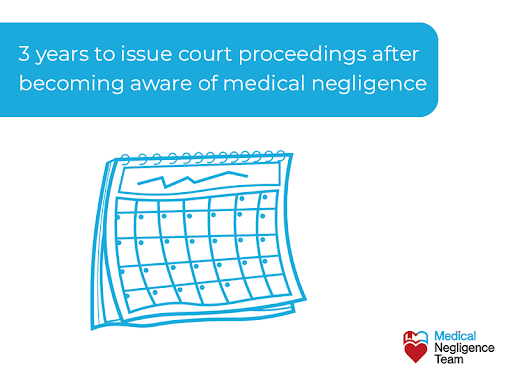
How to settle medical negligence claims against the hospital
Knowing when to settle, how to do it and how much compensation to seek, is the job of your medical negligence solicitor. They will advise you on all aspects of the case, and their experience is invaluable during the tough times.
You should only settle when you are happy with how much compensation you will get for the suffering caused. Your specialist medical negligence solicitors will know how much money your claim is worth and when you and they are close to achieving that goal.
Nobody wants to have to make a medical negligence claim. Getting the compensation you deserve is often the only way to put things right again.
Make a medical negligence claim today
At the Medical Negligence Team our experience will guide you through any medical negligence claim. We have the record and the expertise to provide all medical negligence services.
To make a medical negligence claim takes time and effort. We have all the skills and expertise to do that for you.
Our unique 100% compensation promise ensures all compensation goes to you. After all, you are the one who suffered the medical negligence. The no win, no fee policy means you will not be out of pocket, regardless of the outcome.
Contact the Medical Negligence Team to claim compensation for your negligent hospital care.

